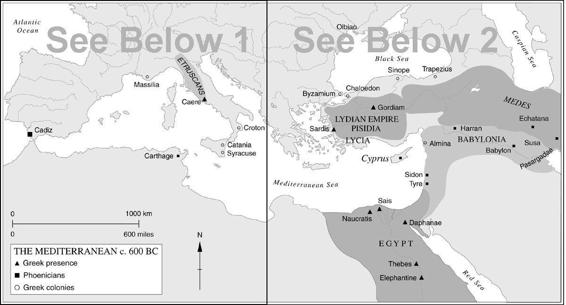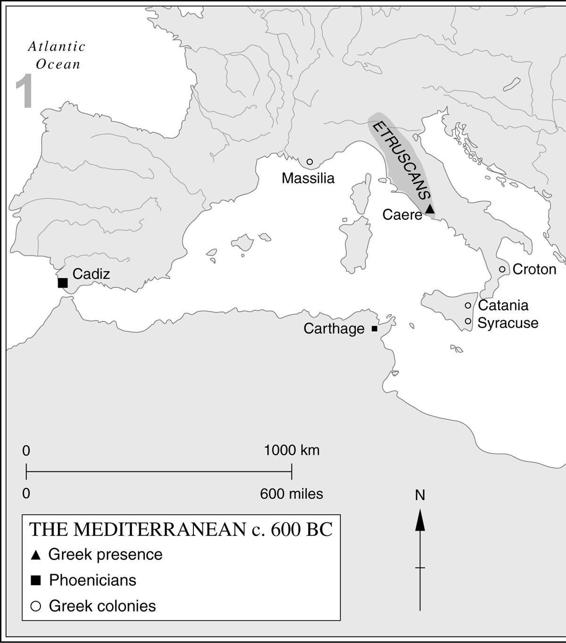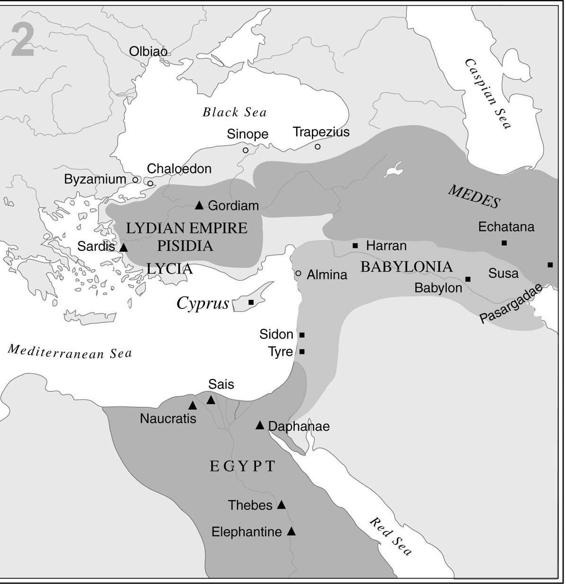The New Penguin History of the World (43 page)
Read The New Penguin History of the World Online
Authors: J. M. Roberts,Odd Arne Westad

Hellenistic civilization preserved the Greek tradition most successfully in science, and here Alexandria, the greatest of all Hellenistic cities, was pre-eminent. Euclid was the greatest systematizer of geometry, defining it until the nineteenth century, and Archimedes, who is famous for his practical achievements in the construction of war-machines in Sicily, was probably Euclid’s pupil. Another Alexandrian, Eratosthenes, was the first man to measure the size of the earth, and yet another, Hero, is said to have invented a steam engine and certainly used steam to transmit energy. It is inconceivable that the state of contemporary metallurgy could ever have made the widespread application of this discovery practicable, which probably
explains why we hear no more of it. The point is of general relevance; the intellectual achievements of the ancient world (and of European medieval civilization later) often pushed up to the limits of existing technical skills but could not be expected to go beyond them; further progress had to wait for better instrumentation. Another Hellenistic Greek, Aristarchus of Samos, got so far as to say that the earth moved around the sun, though his views were set aside by contemporaries and posterity because they could not be squared with Aristotelian physics which stated the contrary; the truth or falsity of both views remained untested experimentally. In hydrostatics, it is true, Archimedes made great strides (and invented the windlass, too) but the central achievement of the Greek tradition was always mathematical, not practical, and in Hellenistic times it reached its apogee with the theory of conic sections and ellipses and the founding of trigonometry.
These were important additions to humanity’s tool kit. Yet they were less distinct from what went before than was Hellenistic moral and political philosophy. It is tempting to find the reason for this in the political change from the city-state to larger units. It was still in Athens that the philosophy of the age found its greatest centre and Aristotle had hoped to reinvigorate the city-state; in the right hands, he thought, it could still provide the framework for the good life. The unhappy last age of the city-state after the Peloponnesian War and the size and impersonality of the new monarchies must have soon sapped such confidence. In them, the old patriotic impulse of the city-states had dried up. Efforts were made to find other ways of harnessing public loyalty and emotion. Perhaps because of the need to impress non-Greeks, perhaps because they felt the positive attraction of the world beyond Greek culture, the new monarchs buttressed themselves more and more with oriental cults attached to the person of the ruler, whose origins went back into the Mesopotamian and Egyptian past. Extravagant titles were employed but perhaps much of this was flattery: ‘Soter’, as Ptolemy I was called, meant ‘Saviour’. The Seleucids allowed themselves to be worshipped, but the Ptolemies outdid them; they took over the divine status and prestige of the Pharaohs (and practice, too, to the extent of marrying their sisters). Meanwhile, the real basis of the Hellenistic states was bureaucracy unchecked by traditions of civic independence – since the Seleucids had founded or refounded most of the Greek cities in Asia, what they had given they could take back – and armies of Greek and Macedonian mercenaries which relieved them of dependence on native troops. Powerful and awe-inspiring though they might be, there was little in such structures to capture their very mixed subjects’ loyalties and emotions.
Probably the erosion of those emotions had gone too far even before Alexander. The triumph of Greek culture was deceptive. Language went on being used, but with a different meaning. Greek religion, for example, a great force for unity among Hellenes, rested not on ecclesiastical institutions but on respect for the Homeric gods and goddesses and the behaviour they exemplified. Beyond this, there were the city cults and official mysteries. This had already begun to change, possibly as early as the fifth century, when, under the impact of the prolonged war, the Olympian gods began to lose the respect paid to them. There was more than one cause of this. The rationalism of much Greek fourth-century philosophy is as much a part of the story as the rise of new fears. With the Hellenistic age another influence is felt, that of a pervasive irrationality, of the pressure of fortune and fate. Men sought reassurance in new creeds and faiths. The popularity of astrology was one symptom. All this only came to its climax as late as the first century
BC
, ‘the period’, says one scholar, ‘when the tide of rationalism, which for the past hundred years had flowed ever more sluggishly, has finally expended its force and begins to retreat’. This is perhaps further ahead than we need look at this point in the story, but one thing about this reversal is striking at an early date. Swamped as the Hellenistic world was with mysteries and crazes of all kinds, from the revival of Pythagorean mysticism to the raising of altars to dead philosophers, traditional Greek religion was not a beneficiary. Its decay had already gone too far. The decline of Delphi, remarked from the third century, was not arrested.
This collapse of a traditional religious framework of values was the background to philosophical change. The study of philosophy was still vigorous in Greece itself and even there its Hellenistic development suggests that men were falling back upon personal concerns, contracting out of societies they could not influence, seeking shelter from the buffets of fate and the strain of daily life. It seems somewhat familiar. One example was Epicurus, who sought the good in an essentially private experience of pleasure. Contrary to later misinterpretations, he meant by this something far from self-indulgence. For Epicurus, pleasure was psychological contentment and the absence of pain – a view of pleasure somewhat austere to modern eyes. But symptomatically its importance is considerable because it reveals a shift in men’s preoccupations towards the private and personal. Another form of this philosophic reaction advocated the ideals of renunciation and non-attachment. The school known as the Cynics expressed contempt for convention and sought release from dependence on the material world. One of them, Zeno, a Cypriot, who lived at Athens, began to teach a doctrine of his own in a public place, the
stoa Poikile
. The place
gave its name to those he taught, the Stoics. They were to be among the most influential of philosophers because their teaching was readily applicable to daily life. Essentially the Stoics taught that life should be lived to fit the rational order they discerned running through the universe. Man could not control what happened to him, they said, but he could accept what was sent by fate, the decree of the divine will in which they believed. Virtuous acts, accordingly, should not be performed for their likely consequences, which might well be unfortunate or thwarted, but for their own sake, because of their intrinsic value.
In Stoicism, which was to have great success in the Hellenistic world, lay doctrine which gave the individual a new ground for ethical confidence at a time when neither
polis
nor traditional Greek religion retained their authority. Stoicism also had the potential for a long life, because it applied to all men, who, it taught, were all alike: this was the seed of an ethical universalism which gradually transcended the old distinction between Greek and barbarian, as it would any other distinction between reasonable men. It spoke to a common humanity and actually produced a condemnation of slavery, an amazing step in a world built by forced labour. It was to be a fecund source for thinkers for two thousand years. Soon its ethic of disciplined common sense was to have great success at Rome.
Philosophy thus showed the symptoms of the eclecticism and cosmopolitanism which strike the eye in almost every other aspect of Hellenistic culture. Perhaps their most obvious expression was the adaptation of Greek sculpture to the monumental statuary of the East, which produced such monsters as the hundred-foot-high Colossus of Rhodes; yet in the end eclecticism and cosmopolitanism appeared everywhere, in the aspirations of the Stoics just as in the exotic oriental cults which displaced the Greek gods. It was the scientist Eratosthenes who said that he saw all good men as fellow countrymen and the remark expresses the new spirit which was Hellenism at its best.
The political framework of this world was bound in the end to change, because sources of change grew up beyond its circumference. One early omen was the appearance of a new threat in the east, the kingdom of Parthia. By the middle of the third century
BC
the weakness imposed by the Seleucid kingdom’s concentration of population and wealth in its western half was leading to over-preoccupation with relations with the other Hellenistic states. The north-east was threatened – as always – by nomads from the steppes, but government was distracted from this danger by the need to supply money and resources for quarrels with Ptolemaic Egypt. The temptation for a remote satrap to strike out on his own as a warlord was often irresistible. Scholars contest the details, but one of the satrapies in which this happened was Parthia, an important area to the south-east of the Caspian. It was to become more important still as the centuries passed for it lay across the caravan route to Central Asia by which the western classical world and China came to be remotely in touch – the Silk Road.



Who were the Parthians? They were originally the Parni, one of those Indo-European nomadic peoples who emerged from Central Asia to create and re-create a political unity in the highlands of Iran and Mesopotamia. They became a byword for a military skill then peculiar to them: the discharging of arrows by mounted horsemen. They did not build nearly five hundred years of political continuity only on this, though. They also inherited an administrative structure left to the Seleucids by Alexander, who had taken it from the Persians. Indeed, in most things the Parthians seemed inheritors, not originators; their great dynasty used Greek for its official documents, and they seem to have had no law of their own but to have readily accepted existing practice, whether Babylonian, Persian or Hellenistic.
Much about their early history remains obscure. There was a kingdom, whose centre remains undiscovered, in Parthia in the third century
BC
, but the Seleucids do not seem to have reacted strongly to it. In the second century, when the Seleucid monarchy was much more disastrously engaged in the west, two brothers, the younger of whom was Mithridates I, established a Parthian empire, which at his death stretched from Bactria (another fragment of the Seleucid inheritance which had been finally separated from it at about the same time as Parthia) in the east to Babylonia in the west. Consciously reminiscent of those who had gone before, Mithridates
described himself on his coins as the ‘great king’. There were setbacks after his death but his namesake Mithridates II recovered lost ground and went even further. The Seleucids were now confined to Syria. In Mesopotamia the frontier of his empire was the Euphrates and the Chinese opened diplomatic relations with him. The coins of the second Mithridates bore the proud Achaemenid title, ‘King of Kings’, and the inference is reasonable that the Arsacid dynasty to which Mithridates belonged was now being consciously related to the great Persian line. Yet the Parthian state seems a much looser thing than the Persian. It is more reminiscent of a feudal grouping of nobles about a warlord than a bureaucratized state.